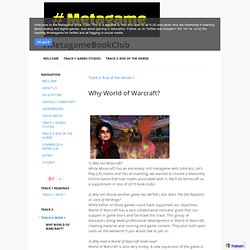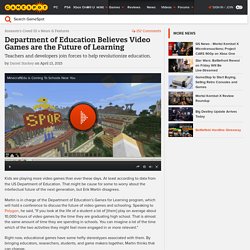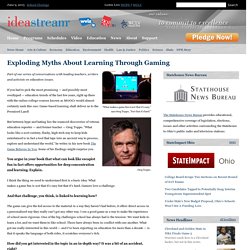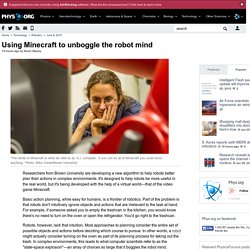

Plus.google. Sites.google. 1) Why not Minecraft?

While Minecraft has an extremely rich metagame with tutorials, Let's Play (LP) videos and lots of modding, we wanted to choose a Massively Online Game that had novels associated with it. We'll do Minecraft as a supplement in one of 2015 book clubs. 2) Why not choose another game like SWTOR ( Star Wars The Old Republic) or Lord of the Rings? 6 Minecraft lesson ideas for your Common Core math class.
Jim Pike December 1st, 2014 From graphing paper to algebra puzzles, one teacher shares tons of practical lesson ideas for turning math class into “Mathcraft” Last year I taught third-grade math in a whole new way.

Combining elements from the wildly popular sandbox game Minecraft, I had students thinking visually and creatively about mathematical models and theories that went way beyond a typical third-grade curriculum, transforming math class into what I like to call Mathcraft. Why Minecraft? I could say I am using Minecraft for a number of reasons, like how I find Minecraft enhances metacognition by increasing students’ memory storage capacity. However, the real reason I use Minecraft is that the students chose it. 1. (Next page: 5 more ways to use Minecraft, including adding in maker elements and changing classroom culture) Your Thoughts: What Makes A Game Good? MindShift sur Twitter : "Bypassing the Textbook: Video Games Transform Social Studies Curriculcum #gbl #sschat #edtech. New Minecraft Mod Teaches You Code as You Play. Department of Education Believes Video Games are the Future of Learning - GameSpot. Kids are playing more video games than ever these days.

At least according to data from the US Department of Education. That might be cause for some to worry about the intellectual future of the next generation, but Erik Martin disagrees. Martin is in charge of the Department of Education's Games for Learning program, which will hold a conference to discuss the future of video games and schooling. Speaking to Polygon, he said, "If you look at the life of a student a lot of [them] play on average about 10,000 hours of video games by the time they are graduating high school. That is almost the same amount of time they are spending in schools. Right now, educational games have some hefty stereotypes associated with them. Exploding Myths About Learning Through Gaming.
Part of our series of conversations with leading teachers, writers and activists on education issues.

If you had to pick the most promising — and possibly most overhyped — education trends of the last few years, right up there with the online college courses known as MOOCs would almost certainly rank this one: Game-based learning shall deliver us to the Promised Land! But between hype and hating lies the nuanced discoveries of veteran education reporter — and former teacher — Greg Toppo. "What looks like a 21st-century, flashy, high-tech way to keep kids entertained is in fact a tool that taps into an ancient way to process, explore and understand the world," he writes in his new book The Game Believes In You.
Some of his findings might surprise you. You argue in your book that what can look like escapist fun in fact offers opportunities for deep concentration and learning. How Video Games Make You Work. My virtual employment history lacks, some might say, a certain focus.

In the 1983 arcade game Tapper, I spent a summer as a bartender, sliding jugs of Budweiser with showboating precision along polished tables, to the delight of patrons. Paperboy, from 1985, had me bicycling up and down a suburban street, hurling newspapers into the mailboxes of subscribers, and taking the odd moment to vandalize the home of any non-subscriber. (The print industry’s decline commenced, I maintain, with my retirement from that gig.) SimCity, from 1989, landed me a role as a municipal planner, arranging the layouts of streets, placing electrical lines and sewage plants, and rolling with the odd natural disaster. Crazy Taxi (1999) put me behind the wheel of a low-slung cab, streaking through major cities to deliver passengers to their implausibly urgent appointments at Pizza Hut or Tower Records. Using Minecraft to unboggle the robot mind.
Researchers from Brown University are developing a new algorithm to help robots better plan their actions in complex environments.

It's designed to help robots be more useful in the real world, but it's being developed with the help of a virtual world—that of the video game Minecraft. Basic action planning, while easy for humans, is a frontier of robotics. Part of the problem is that robots don't intuitively ignore objects and actions that are irrelevant to the task at hand. For example, if someone asked you to empty the trashcan in the kitchen, you would know there's no need to turn on the oven or open the refrigerator.
You'd go right to the trashcan. Robots, however, lack that intuition. "It's a really tough problem," said Stefanie Tellex, assistant professor of computer science at Brown. The Rise of the ‘Gaming for Good’ Movement. Camilla Gagliolo watches as children in William Donovan's fourth-grade class study a Virginia history lesson on iPads at Jamestown Elementary School in Arlington, Virginia on March 13, 2012.

New games are designed to improve children’s sociability, schoolwork and overall behavior. Mary F.